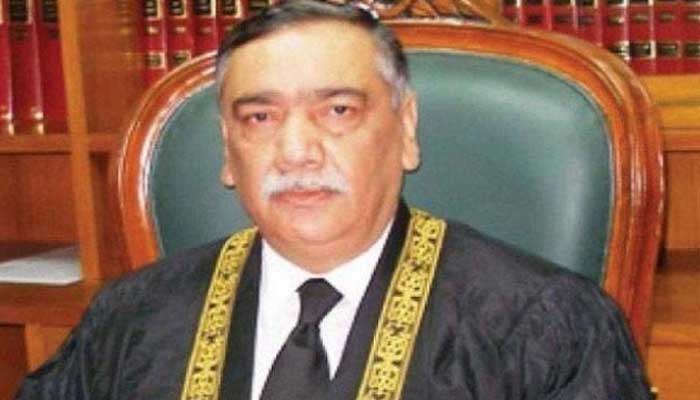SC acquits imprisoned ‘murderer’ 10 years after conviction
A three-member bench, headed by Chief Justice Asif Saeed Khosa, acquitted Asfandyar with the ruling that the prosecution failed to prove the allegations against him.
ISLAMABAD: The Supreme Court of Pakistan on Tuesday released a man convicted by trial courts in a murder case and who had been in jail for 10 years. The SC also summoned a magistrate on February 22 for not following the legal procedure in the case.
A three-member bench, headed by Chief Justice Asif Saeed Khosa, acquitted Asfandyar with the ruling that the prosecution failed to prove the allegations against him. The court summoned Magistrate Kanwar Anwar Ali for not following the legal procedure and failing to conduct the identity parade properly.
According to the case, in 2009, the trial court awarded death sentence to Asfandyar for murdering Adil Butt, a student. According to the prosecution, Asfandyar had kidnapped Butt for ransom and killed him after the victim's family failed to pay money. Later, the Lahore High Court overturned the trial court verdict awarding death sentence and sent the man on life imprisonment. Thereafter, Asfandyar filed an appeal before the Supreme Court of Pakistan.
On Tuesday, the Supreme Court said the prosecution had failed to establish the case against the accused and acquitted him. The court observed that a child was killed and the suspect was convicted due to the magistrate's failure to hold the identity parade properly and follow the legal procedure.
The chief justice said it is painful when such a case comes to the surface. But why an accused is being treated in such a way, he questioned and stressed that people who are required to follow the law should be held responsible. The chief justice inquired whether people are not being properly trained before being posted as magistrates. He said the suspect is real but all testimonies are false. "Where will the law go if we shut our eyes? Someone has to start ensuring the law is being followed,” Justice Khosa said.
The counsel for the petitioner told the court that legal training is provided before appointing someone as a magistrate. The court pointed out differences in recorded statements. The chief justice raised questions over the procedure the police followed to determine the guilt of a suspect. He observed it appears that testimonies were developed after the suspect was arrested, asking as to how the police reached the suspect.
The counsel for the petitioner submitted that an "informer" had told the police about the suspect's involvement. Later, the police found out that the suspect had disposed of the body in a stream.
-
 South Korea: Two Killed As Military Helicopter Crashes During Training
South Korea: Two Killed As Military Helicopter Crashes During Training -
 Elon Musk Unveils SpaceX’s Moon-first Strategy With ‘self Growing Lunar City’
Elon Musk Unveils SpaceX’s Moon-first Strategy With ‘self Growing Lunar City’ -
 Donald Trump Slams Bad Bunny's Super Bowl Performance: 'Absolutely Terrible'
Donald Trump Slams Bad Bunny's Super Bowl Performance: 'Absolutely Terrible' -
 Jake Paul Criticizes Bad Bunny's Super Bowl LX Halftime Show: 'Fake American'
Jake Paul Criticizes Bad Bunny's Super Bowl LX Halftime Show: 'Fake American' -
 Prince William Wants Uncle Andrew In Front Of Police: What To Expect Of Future King
Prince William Wants Uncle Andrew In Front Of Police: What To Expect Of Future King -
 Antioxidants Found To Be Protective Agents Against Cognitive Decline
Antioxidants Found To Be Protective Agents Against Cognitive Decline -
 Hong Kong Court Sentences Media Tycoon Jimmy Lai To 20-years: Full List Of Charges Explained
Hong Kong Court Sentences Media Tycoon Jimmy Lai To 20-years: Full List Of Charges Explained -
 Coffee Reduces Cancer Risk, Research Suggests
Coffee Reduces Cancer Risk, Research Suggests -
 Katie Price Defends Marriage To Lee Andrews After Receiving Multiple Warnings
Katie Price Defends Marriage To Lee Andrews After Receiving Multiple Warnings -
 Seahawks Super Bowl Victory Parade 2026: Schedule, Route & Seattle Celebration Plans
Seahawks Super Bowl Victory Parade 2026: Schedule, Route & Seattle Celebration Plans -
 Keto Diet Emerges As Key To Alzheimer's Cure
Keto Diet Emerges As Key To Alzheimer's Cure -
 Chris Brown Reacts To Bad Bunny's Super Bowl LX Halftime Performance
Chris Brown Reacts To Bad Bunny's Super Bowl LX Halftime Performance -
 Trump Passes Verdict On Bad Bunny’s Super Bowl Halftime Show
Trump Passes Verdict On Bad Bunny’s Super Bowl Halftime Show -
 Super Bowl 2026 Live: Seahawks Defeat Patriots 29-13 To Win Super Bowl LX
Super Bowl 2026 Live: Seahawks Defeat Patriots 29-13 To Win Super Bowl LX -
 Kim Kardashian And Lewis Hamilton Make First Public Appearance As A Couple At Super Bowl 2026
Kim Kardashian And Lewis Hamilton Make First Public Appearance As A Couple At Super Bowl 2026 -
 Romeo And Cruz Beckham Subtly Roast Brooklyn With New Family Tattoos
Romeo And Cruz Beckham Subtly Roast Brooklyn With New Family Tattoos




